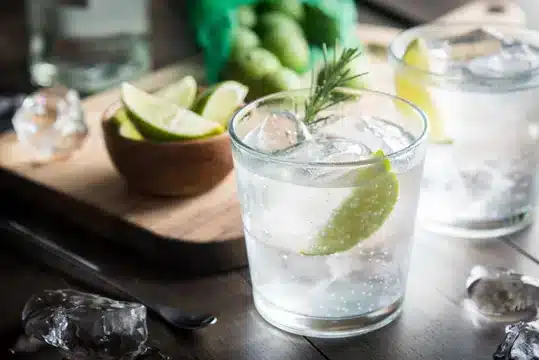Nowadays, many beverages are referred to as "tonics"; they typically share two key characteristics. They are carbonated, and they contain a herbal component that is intended to be beneficial to health. The real, authentic OG tonic water, however, is unparalleled. It's the counterpart to gin and has a sour, bitter flavor that makes your tongue twist before making you want more.
Quinine and sugar are combined to create this bubbly and cooling beverage. It makes a fantastic mixer for simple cocktails and mixed beverages. There are numerous brands, some of which have fewer calories and sugar. To learn everything there is to know about this well-known sparkling water, keep reading.
Tonic Water, What It Is
This beverage is made with natural ingredients such as herbs. It is a carbonated beverage having a quinine-based component that gives it its bitter flavor. But don't worry; manufacturers frequently add sugar to counteract the bitterness, giving the beverage a bittersweet flavor.
What's more, doctors regarded it as a medicinal tonic given to soldiers at the beginning of the nineteenth century to combat malaria. Because of its preferred bitter taste, tonic water has gained favor as a palate cleanser since then. Many alcoholic beverages are utilized as ingredients, including gin, tequila, and vodka.
How Is Tonic Water Made?
There are several ways to make tonic water. One method is through the use of quinine, which is a bitter alkaloid substance found in the bark of the cinchona tree. Some producers of tonic water use agave or additional sweeteners to counteract the bitter taste of quinine.
The tonic syrup may contain botanical flavorings like juniper, lemongrass, lavender, elderflower, or ginger, depending on the brand. Tonic water combines fruit and herbs with a "base," usually water, alcohol, or another liquid base. The fruit and herbs are used in a way that makes them taste good or look good.
Ways To Drink Tonic Water
Tonic water is made with natural ingredients and doesn't contain alcohol, so it's safe for most people to drink. It can be an alternative to drinking alcohol because it has a strong taste while containing vitamins and minerals that are good for your body. Use tonic water instead of soda or juice when you're feeling sick and need something with sugar or caffeine.
Additionally, premium tonic water pairs nicely with other alcoholic beverages despite being notably combined with gin. Irish whiskey is a preferred style, and vodka is almost as popular. For the ultimate apéritif, the tonic can also be combined with fortified wines and, for those who truly appreciate a bitter beverage, with bitter spirits like Aperol and Campari.
Although tonic water is most frequently used in alcoholic mixed drinks, it tastes good when served with ice. A splash of lime zest or juice (lime and tonic) offers this non-alcoholic beverage a great boost by balancing the tonic's bitterness with the citrus's tang. Due to its dry flavor, it is a great supper beverage and a palate cleanser you can enjoy between bites or courses.
Tonic is frequently used in simple recipes for mixed beverages that call for only a few ingredients. It is a fantastic substitute for sweeter sodas in various cocktail recipes and goes very well with berries and citrus juices. Additionally, it can be blended with cold brew coffee for a revitalizing midday pick-me-up. Combine tonic water with herb-infused syrup, like lavender, for a sweet, floral touch.
Tonic Water Benefits
Drinking tonic water only has one main advantage, which is hydration. It will keep you hydrated and improve your ability to concentrate more than soda or juice because it is still water. Tonic water can help you relax, sleep better and feel less stressed.
Another exciting benefit of this beverage is its application as a versatile mixer for cocktail lovers. Others believe it helps relieve night leg cramps and even RLS, though there’s little science behind this.
Thanks to its low-sodium and cholesterol-free nature, tonic water may be considered a “healthy” drink for those watching their weight. But just like everything else, it’s best when taken in moderation.
What is Quinine?
Quinine has been used as a medicine since 1820, first extracted from the bark of the cinchona tree by French scientist Pierre Joseph Pelletier. It is an alkaloid, a mild stimulant on the central nervous system (CNS). Also, it has anti-inflammatory properties and prevents blood clots from arising after surgery or injuries.
In very small doses, quinine will help you feel more energized because it increases blood flow throughout your body. However, taking too much at once can cause side effects such as dizziness or diarrhea!
Final Thoughts
Hopefully, you enjoyed learning about tonic water, the benefits of its ingredients, and how it's made. Tonic water is a great drink to have close to you when you need a little pick-me-up!
References:
https://www.masterclass.com/articles/what-is-tonic
https://home.binwise.com/blog/what-tonic-water
https://www.thespruceeats.com/what-is-tonic-water-5101606

Isreal olabanji a dental assistant and public health professionals and has years of experience in assisting the dentist with all sorts of dental issues.
We regularly post timely and trustworthy medical information and news on Fitness, Dental care, Recipes, Child health, obstetrics, and more.
The content is intended to augment, not replace, information provided by your clinician. It is not intended nor implied to be a substitute for professional medical advice. Reading this information does not create or replace a doctor-patient relationship or consultation. If required, please contact your doctor or other health care provider to assist you to interpret any of this information, or in applying the information to your individual needs.






